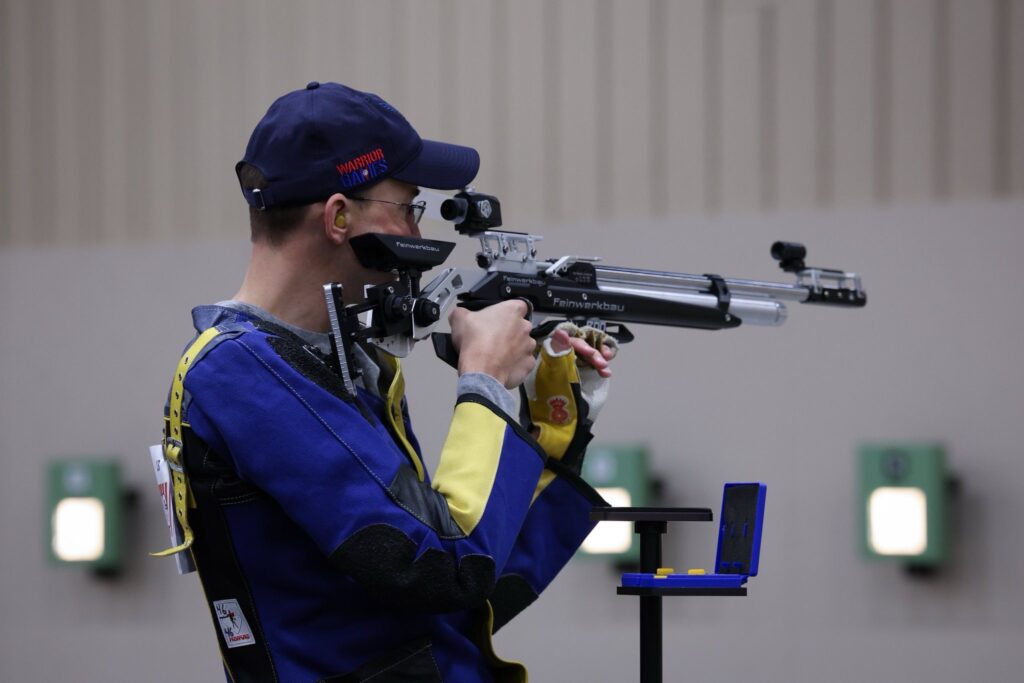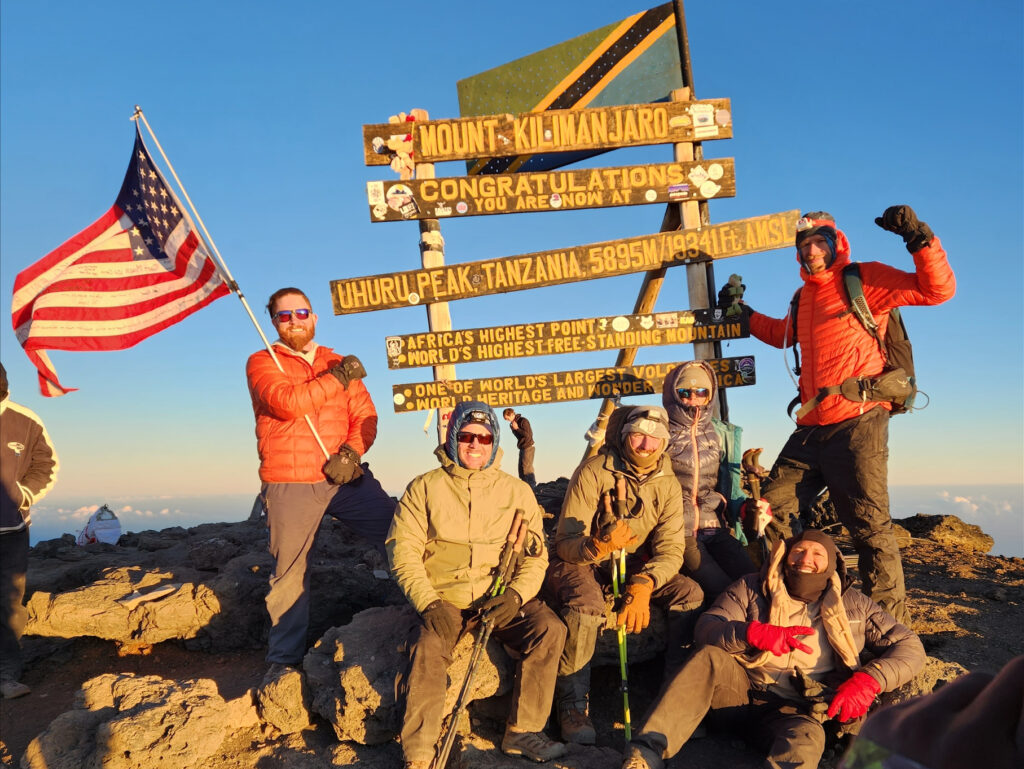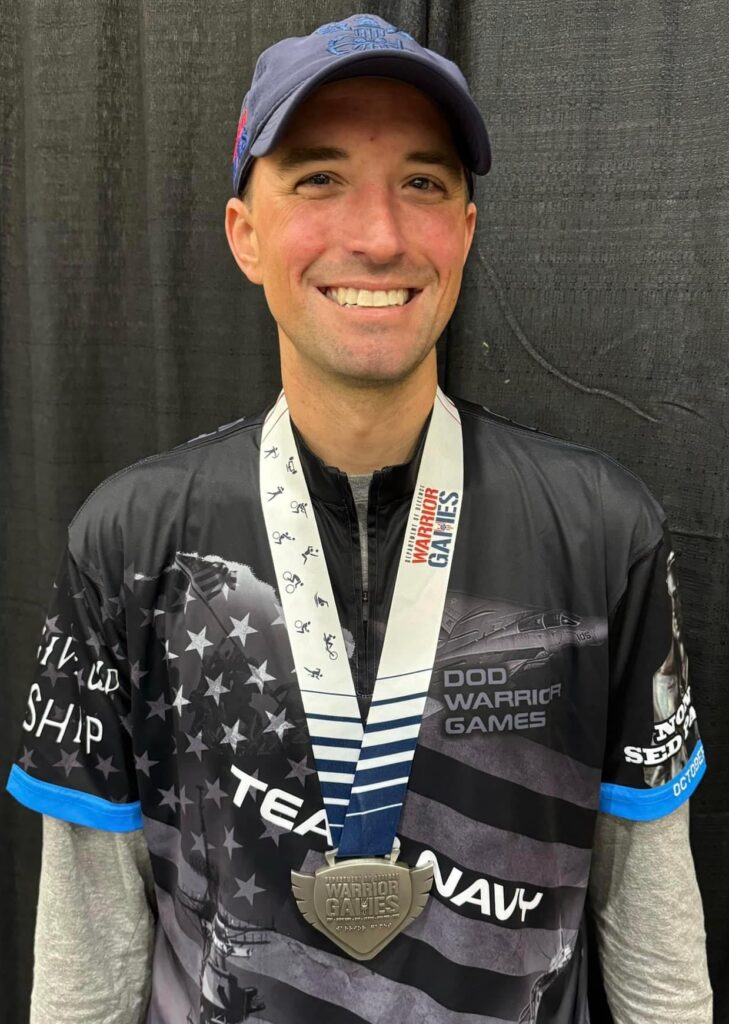In June, hundreds of athletes met in Florida for a unique annual competition involving contestants from every branch of the U.S. military. The Department of Defense (DOD) started holding adaptive-sports contests in 2010, highlighting and celebrating the resilience and skills of wounded, ill, and injured veterans and active-duty servicemembers. Known as the DoD Warrior Games, the yearly tournament brings men and women from the U.S. Army, Air Force, Navy, Marines, Coast Guard, Special Operations Command, and even the Space Force to go beyond the uniform and compete in an array of adaptive sports.
Among the contestants this year was Team Rubicon’s own Steve Flemming.
Adaptive sports are not new. Some, like the Special Olympics or Paralympics, have been around for decades and attract significant attention from donors and audiences, other adaptive sports, like the DoD Warrior Games, are newer and focus on a more niche population.

A Greyshirt and Team Rubicon’s Manager of Operations, Flemming represented the U.S. Navy in the 2024 DoD Warrior Games.
A native Texan, Flemming enlisted in the Navy in 2005 as a Corpsman and over his career served in Korea, Africa, and several Middle Eastern countries, as well as in combat operations in Afghanistan. He spent his time in uniform with numerous Marine Corps commands, Naval Forces Korea, and Navy Medicine Training Support Command, capping his years as the Navy Senior Enlisted Advisor at Marine Corps Forces Central Command.
In January 2018, Flemming had to fight to stay in the Navy after being diagnosed with multiple sclerosis, a chronic disease of the central nervous system that can damage the brain and spinal cord. He had to go through the medical board process and remembers arguing with his doctors in order to be permitted to remain in the service. He trained, he worked hard, and he got cleared to stay in. He was promoted again and deployed again.
Then, during his final tour, in January of 2023, Flemming was diagnosed with stage 4 pancreatic neuroendocrine cancer, attributed to his exposure to burn pits on the front lines.
That August, after his cancer diagnosis, he climbed Mount Kilimanjaro, the tallest mountain in Africa, with a group of 10 other disabled veterans. Fighting cancer, Flemming says, has changed his perspective and added purpose to his life.
“I’ve been blown up three times in combat. I’d been diagnosed with post-traumatic stress,” Flemming explains. “I served overseas, a lot of combat advising, and actual direct combat roles, and was Navy corpsman by trade. I spent virtually my entire career with the Marines. And then they tell me the severity of my diagnosis—that it’s inoperable. And I was like, no, it’s not my plan. It doesn’t fit.”
He knew he had to take control of his life and Kilimanjaro was his mechanism for that. He hasn’t stopped since. Two months after descending Africa’s highest point, and roughly a year before he would medically retire—after 18 years and nine months in service—Flemming attended his first camp for the Warrior Games. To participate as an athlete in the Warrior Games, prospective contestants must first qualify in tryouts at camps, clinics, or similar sorts of trials for their respective service teams.

Warrior Games athletes have another consideration that competitors in most other adaptive sports competitions don’t have to meet: eligibility. To be eligible, Flemming explains, “You must be in the injury management program and then your case manager recommends you, based on where you’re at with your treatment.”
That’s because the Warrior Games, at heart, were designed to be part of the recovery process. The Games are supposed to help with the rehabilitation of wounded, ill, and disabled servicemembers and veterans by exposing them to adaptive sports.
“The idea is that you learn new things and take on physical challenges and that it’s all part of your physical recovery,” Flemming says.
The Warrior Games training camps aren’t just for practicing, they’re also for choosing what sports the athletes will compete in and earning a place in the lineup. Flemming qualified for five sports at the 2024 Warrior Games: archery, cycling, precision air sports, swimming, and wheelchair basketball. But it wasn’t just the competing that spurred him on.
“Warrior Games was so awesome,” he describes excitedly. “Because you’re surrounded by a bunch of athletes that are overcoming whatever they consider their greatest thing. You have traumatic brain injuries, and spinal cord injuries, and very significant traumas. And they’re out there just getting it and putting in the sweat equity to get everything they can out of it. And you can see them just giving everything they got and that’s super inspiring. That’s just awesome to feed off of.”
Within the nourishing Olympic atmosphere, Flemming earned silver in standing rifle and placed sixth overall in prone rifle. However, the competitive climate he was in and the inspirational athletes he was surrounded by carry a deeper meaning for him than his rank on the podium or the color of his medal. Every event was conducted by men and women on a journey to find and surpass their, often visibly severe, limitations. Beyond the uniform, far past their physical conditions, these wounded warriors did whatever they had to do to compete. “We had amputees swimming, guys with limited mobility in their arms or legs,” he recounts. “They would have to, tie their arm down so it wouldn’t, you know, float out because they didn’t have rotation ability.”
Along his journey of recovery, Flemming had once been asked what his purpose statement would be in life. He thought hard about it and now keeps his conclusion with him in a notebook: “To inspire support and redefine the way those closest to me understand what is possible.”
“That’s what’s pushing me,” he says. And that’s what he saw at the Warrior Games. “Men and women that are just killing it. One of the archers on the team had one arm, like he’s shooting with his teeth and he’s crushing it, right? I was so pumped and proud of him.”
Servicemembers with significant spinal cord injuries doing track and field, launching a shot put spin and throw from a seated position, shooting rifles from a wheelchair; the competitions were as fierce as the competitors. “We had some serious studs there,” Flemming expounds. “At the end of the day, no matter their limitations, everyone was there to compete.”
Every athlete is permitted to compete in the Warrior Games twice, but Flemming isn’t planning on competing next year—he’s been chosen to join Team US in the 2025 Invictus Games, an international adaptive sports competition for injured and ill servicemembers from dozens of countries. This will be the first Invictus Games to incorporate winter sports and Flemming has already chosen the events he will compete in. Despite being a Texas native, Fleming is competing in winter sports. “I will be doing downhill skiing for the novice division Alpine skiing. I’m doing swimming wheelchair and skeleton.”
Skeleton is one of the more difficult and dangerous winter sports out there. Participants don helmets, lay face down on a sled, and jet down an ice chute at over 80 miles per hour. Why would someone with severe physical challenges, from sunbaked and snowless Texas, attempt such a hard and hazardous event?
“I’ve never done it,” Flemming replies.
An answer characteristic of Warrior and Invictus Games athletes, it seems. “I am the only one in the Navy picked up for skeleton,” he continues. “That got many people pretty grumpy, a lot of people wanted it.”

Flemming is stoic about his circumstance but also aggressive in confronting it. He’s writing a book about his life and the challenges he’s faced, like inoperable cancer and multiple sclerosis, in part because he knows he’s not alone.
“I started calling around and telling guys I was sick, and I found many had been suffering with cancer themselves or were sick and hurting in other ways—and they’re not talking about it,” he recalls. “I was finding guys that I had very close deployment experiences with; been through things that we wouldn’t talk about to other people that hadn’t lived the life; some intimate, violent, dangerous moments together. They’re sick. And they’re not telling anyone.
Flemming knew that he was the one who needed to start talking about it.
Discovering so many comrades in arms were secretly in pain spawned in Flemming the same idea that generated the Warrior Games: being invisible doesn’t help anyone. Wounded warriors deserve celebration and accommodation. Adaptive sports exist to allow people with disabilities to fully participate in society, to raise awareness of the further need for accommodation, and to remove barriers to success and achievement. “A rock is a rock,” says Flemming philosophically, “until you pick it up and use it as a hammer, right?”



